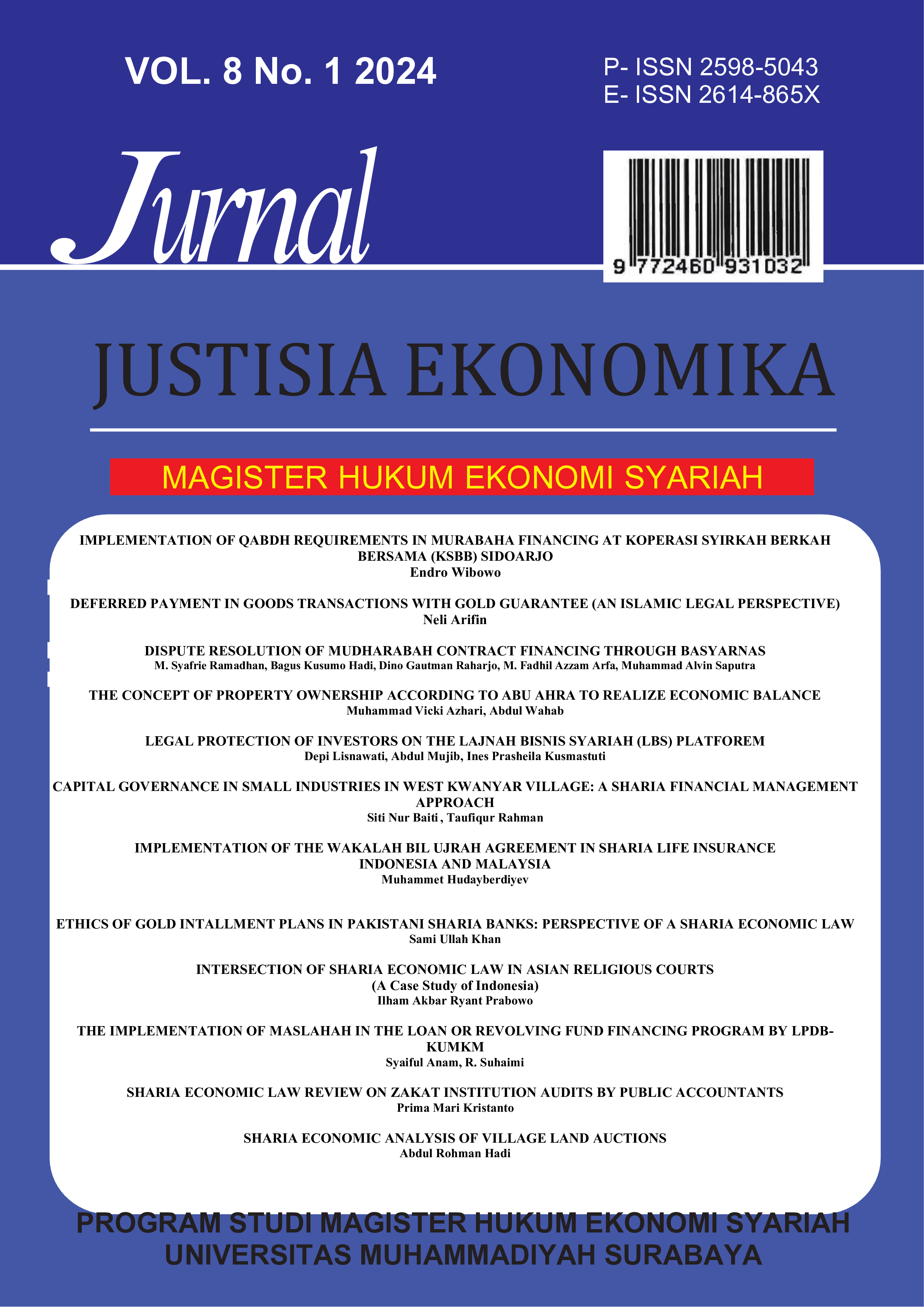THE IMPLEMENTATION OF MASLAHAH IN THE LOAN OR REVOLVING FUND FINANCING PROGRAM BY LPDB-KUMKM
DOI:
https://doi.org/10.30651/justeko.v8i1.21753Keywords:
Maslahah, Loan, Financing, Revolving fund, LPDB-KUMKMAbstract
This research aims to delve into the implementation of the concept of maslahah in the revolving fund loan or financing program managed by the Cooperatives, Micro, Small, and Medium Enterprises Revolving Fund Management Agency (LPDB-KUMKM). The research method employed is a literature review with a descriptive qualitative approach. Secondary data was obtained from various sources, including journals, relevant research, and books related to the research context. The results of the research indicate that LPDB-KUMKM has overall implemented the maslahah concept in its programs. This finding is reflected in several aspects. Firstly, LPDB-KUMKM has successfully fostered economic self-reliance for its cooperative and MSME partners through fund provision, training, and mentoring. Secondly, the institution ensures that all implemented programs adhere to the characteristics of Sharia compliance by avoiding elements of usury, ambiguity, and gambling. Thirdly, the institution conducts a comprehensive risk evaluation, encompassing credit risk, operational risk, and compliance risk. The fourth, LPDB-KUMKM actively engages in community empowerment through training programs, mentoring, and providing access to other resources. The fifth aspect encompasses LPDB-KUMKM's commitment to accountability and transparency at every stage of revolving fund management. Finally, the institution actively participates in an ongoing evaluation and improvement process to ensure the efficiency and effectiveness of the implemented programs.
References
Al-Arabi, Ibnu, 1957, Ahkām al-Qurān, Isa al-Halaby, Mesir.
Al-Bhuti, Said Ramadhan, 1973, Dlawabit al-Maslahah fi Syariah al-Islamiyah, Muassasah Risalah.
Al-Ghazali, Abu Hamid Muhammad bin Ahmad, 1368, al-Mustashfa Min Ilmi al-Ushul, Qum: Intisyarat Dar al-Dzakhair.
As-Syatibi, 1997, al-Muwafaqat fi Ushul al-Syariah, Beirut: Dar al-Kutub al-Ilmiyah.
Hadi, Sutrisno, 2002, Metodelogi Research, Andi Offset, Yogyakarta.
Mahmud, Abdul Hamid Ali Hamdi, Al-maslahah al-mursalah wa tatbiqotuha al-muasiroh fi al-hukmi wa al-nidzam al-siyasiyah, Tesis Universitas Nasional An-najah Palestina.
Peraturan Direksi Lembaga Pengelola dana bergulir koperasi dan usaha mikro, kecil dan menengah No. 010/PER/LPDB/2011 tentang petunjuk teknis pemberian tambahan pinjaman atau pembiayaan kepada koperasi, direksi lembaga pengelola dana bergulir koperasi dan usaha mikro, kecil dan menengah RI.
Peraturan Menteri Keuangan Republik Indonesia Nomor 158/PMK.06/2021 Tentang Perubahan Atas Peraturan Menteri Keuangan Nomor 168/pmk.06/2018 Tentang Penentuan Nilai Bersih Investasi Jangka Panjang Nonpermanen Dalam Bentuk Tagihan.
Peraturan Menteri Koperasi dan Usaha Kecil dan Menengah Republik Indonesia Nomor 8 Tahun 2020 Tentang Organisasi dan Tata Kerja Lembaga Pengelola Dana Bergulir Koperasi dan Usaha Mikro, Kecil dan Menengah.
Peraturan Menteri Koperasi dan Usaha Kecil dan Menengah Republik Indonesia Nomor 4 Tahun 2020 Tentang Penyaluran Pinjaman atau Pembiayaan Dana Bergulir Oleh Lembaga Pengelola Dana Bergulir Koperasi dan Usaha Mikro, Kecil dan Menengah.
Rencana Bisnis dan Anggaran LPDB-KUMKM 2019
Saeed, Abdullah, 1996, Islamic Banking and Interest, A Study of Prohibition of Riba and Its Contemporary Interpretation, Leiden: EJ. Brill.
Sholihin, Ahmad Ifham, 2013, Buku Pintar Ekonomi Syariah, Gramedia Pustaka Utama, Jakarta.
Sumanto, 2014, Teori dan Metode Penelitian, CAPS (Center of Academic Publishing Service), Yogyakarta.
UU RI Nomor 20 Tahun 2008 Tentang UMKM.
UU RI Nomor 25 Tahun 1992 Tentang Perkoperasian.
Widialoka, Winny, 20116, Analisis Pengaruh Kepatuhan Syariah (Shariah Compliance) terhadap Dana Pihak Ketiga Pada Bank Umum Syariah di Indonesia Periode Tahun 2010-2015”, Vol 2, No 2.
Wirdyaningsih, 2005, Bank dan Asuransi Islam di Indonesia, Kencana, Jakarta.
Zarkasyi, Badruddin Muhammad bin Bahadir, al-Bahrul Muhit Fi Ushul al-Fiqh.
Downloads
Published
How to Cite
Issue
Section
License
HAK CIPTA
Penulis yang mengirimkan artikel dalam jurnal Justisia Ekonomika harus memahami dan menyetujui persyaratan tentang hak cipta jurnal Justisia Ekonomika sebagai berikut:
1. Hak Cipta tulisan / artikel yang diterbitkan di jurnal Justisia Ekonomika otomatis menjadi hak pengelola jurnal atau publisher
2. Meskipun Hak Cipta atas tulisan yang telah diterbitkan di jurnal Justisia Ekonomika adalah menjadi haknya publisher, tetapi penulis masih mempunyai hak untuk : a). Penulis boleh meng-upload di repository kampus, b). Penulis boleh meng-upload di webnya sendiri, c). Penulis boleh meng-upload di google schoolar, orchid dan sinta
LISENSI
Lisensi atas tulisan / artikel yang diterbitkan di jurnal Justisia Ekonomika adalah menggunakan Creative Commons dengan atribusi CC-BY-NC 4.0






















